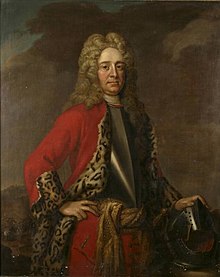Loading AI tools
British army officer and politician From Wikipedia, the free encyclopedia
Robert Hunter FRS (c. 1666 – 31 March 1734) was a Scottish military officer, playwright and colonial administrator who successively served as the governors of New York, New Jersey and Jamaica.
Robert Hunter | |
|---|---|
 Portrait of Hunter, attributed to Godfrey Kneller, c. 1720 | |
| Lieutenant Governor of Virginia | |
| In office 1707 – Captured at sea by the French; never served | |
| Monarch | Anne |
| Preceded by | Edmund Jenings, President of Council |
| Succeeded by | Alexander Spotswood |
| 3rd colonial governor of New Jersey | |
| In office June 1710 – 1720 | |
| Monarchs | |
| Preceded by | Richard Ingoldesby (Lt. Governor) |
| Succeeded by | Lewis Morris, President of Council |
| 19th colonial governor of New York | |
| In office June 1710 – 1719 | |
| Monarchs | |
| Preceded by | Richard Ingoldesby (Lt. Governor) |
| Succeeded by | Pieter Schuyler, Acting Governor |
| Governor of Jamaica | |
| In office 1728 – March 1734 | |
| Monarch | George I |
| Preceded by | John Ayscough, President of Council |
| Succeeded by | John Ayscough, President of Council |
| Personal details | |
| Born | 1666 Edinburgh, Scotland |
| Died | 31 March 1734 (aged 67–68) Jamaica, Great Britain |
| Occupation | Military officer, governor, playwright |
| Signature |  |

Robert Hunter was born c. 1666 in Edinburgh, Scotland, grandson of Robert Hunter, 20th Laird of Hunterston in Ayrshire, being the son of lawyer James Hunter and his wife Margaret Spalding.[1]
He had been apprenticed to an apothecary before running away to join the Scots Army. He became an officer in 1689 who rose to become a general, and married a woman of high rank.
He was a man of business whose first address to the New Jersey Assembly was barely 300 words long. In it, he stated, "If honesty is the best policy, plainness must be the best oratory."
He was appointed Lieutenant Governor of Virginia in 1707, but was captured by a corsair on his way to Virginia, taken to France, and in 1709 exchanged for the French Bishop of Quebec. He was then appointed Governor of New York and sailed to America with 3,000 Palatine refugees as settlers in 1710. In 1715 he advocated the local minting of copper coins, but the king refused. Governor Hunter's philosophy was that "the true Interests of the People and Government are the same, I mean A Government of Laws. No other deserves the Name, and are never Separated or Separable but in Imagination by Men of Craft."[2]
Hunter was succeeded as Governor by Pieter Schuyler as acting governor from 1719 to 1720 and finally by William Burnet, whose post as Comptroller of Customs was given to Hunter in exchange.
Hunter was then Governor of Jamaica from 1727 until his death on 31 March 1734. While in Jamaica, Hunter waged an unsuccessful war against the Jamaican Maroons. He was a member of the Society for the Propagation of the Gospel. He was elected a Fellow of the Royal Society in May 1709.[3]
Hunter was married to Elizabeth (née Orby) Hay, the daughter of Sir Thomas Orby, 1st Baronet of Croyland. Elizabeth was the widow of Brig.-Gen. Lord John Hay, son of John Hay, 2nd Marquess of Tweeddale. Together, they were the parents of at least one son and three daughters (Henrietta Hunter, Catherine (née Hunter) Sloper, Charlotte Hunter), including:[1]
Hunter died on 31 March 1734 in Jamaica, West Indies.[1]
His play, Androboros, written in 1714, was the first known play to be written and published in the North American British Colonies.[4]
Seamless Wikipedia browsing. On steroids.
Every time you click a link to Wikipedia, Wiktionary or Wikiquote in your browser's search results, it will show the modern Wikiwand interface.
Wikiwand extension is a five stars, simple, with minimum permission required to keep your browsing private, safe and transparent.